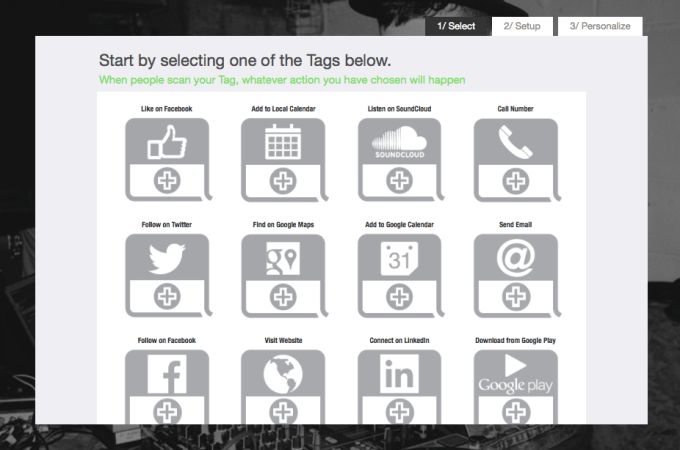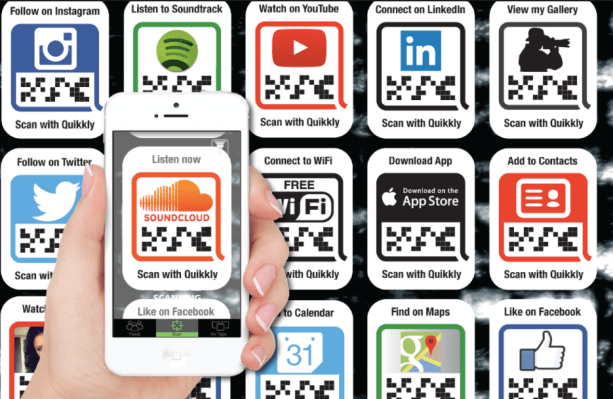You’ve all used a QR code, right? Those weird-looking barcodes you’re supposed to scan using a mobile to open a related web link. Nope? I thought not. For one reason or another, the technology, which was originally developed for the automotive industry to track parts in vehicle manufacturing, has never really gained critical mass from a consumer point of view. Enter Quikkly, which thinks it’s figured out why.
The U.K. startup — whose founders are Ken Johnstone, former founder and CEO of INQ Mobile (the company that punted the first so-called ‘Facebook phone’), and Fergal Walker, the ex-Head of Mobile BD for Facebook EMEA — is another attempt to bridge the physical and digital worlds via your phone’s camera and accompanying mobile app to trigger an online action, but in a way that solves many of the pain points of QR codes.
Using the Quikkly iOS or Android app, you scan what the company is calling an Action Tag — its own proprietary barcode-esque tech — and this immediately invokes an online action, such as listening to a track on Spotify, adding a contact to your address book, following someone on Twitter, or even connecting to a public WiFi spot.
 The clever aspect of a Quikkly Action Tag is that, unlike most uses of QR codes, it’s better sign-posted so you know what action to expect, and the barcode itself is in-part based on image recognition of the related service’s icon, meaning it’s a lot more human-readable as well a being machine-readable.
The clever aspect of a Quikkly Action Tag is that, unlike most uses of QR codes, it’s better sign-posted so you know what action to expect, and the barcode itself is in-part based on image recognition of the related service’s icon, meaning it’s a lot more human-readable as well a being machine-readable.
“When you see interesting stuff online and there’s a button to interact with it, you can click on it and something happens immediately. ‘Like’ on Facebook, ‘Follow’ on Twitter, add to Basket, listen to the song. In the physical world, it’s considerably more difficult,” says Quikkly CEO Fergal Walker. “If you’re interested, you would have to manually search for the item, hope you find the right one, and hope it works on your mobile. Quikkly removes the hassle and makes it as simple as it is online.”
Quikkly also makes it pretty easy for anyone to create their own Action Tags, to be included on, for example, a business card, flyer or poster. This can be done via the website or mobile app. In fact, Quikkly is talking up its mobile-first play. To create an Action Tag, you simply select from a grid of pre-defined actions and fill in the needed details, such as URL and custom message.

On Quikkly’s competitors, Walker concedes there are “loads of QR based companies and image recognition companies out there”, but argues that the startup is doing something quite different. “People know exactly what will happen before they scan a Quikkly Tag. When they scan it happens straight away. It’s just like pressing a button,” he says.
One obvious drawback of Quikkly — and similar to the shortcomings of Beacon technology, which also tries to bridge the physical and online worlds — is that users are required to have an accompanying app. In this case, one that can scan and interpret an Action Tag. The plan, however, is to let third-party app developers also get in on the action.
“You need the Quikkly app to create your own Tags on mobile, but for scanning you can use any Quikkly enabled app (the scanner is available to partner app developers),” explains Walker. “Also, Quikky Tags make it clear which app people need to use. Remember, the average consumer doesn’t know that ‘QR Codes’ are called ‘QR Codes’ so they don’t even know where to start. Quikkly really is ‘do this to get that now’.”
Quikkly is free to use, both scanning and creating Action Tags. However, a paid-for version of the service, with things like additional analytics, will be available to brands and agencies through a subscription model.
